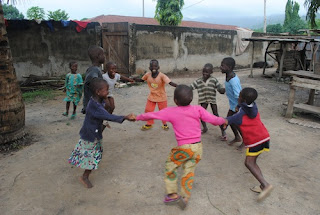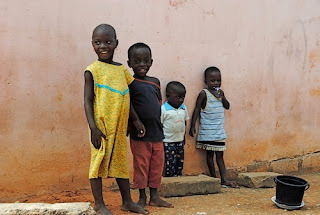Akouvi Etiyaka
Akouvi was born in 1990 and grew up in a slum near the village of Wahala. She is one of eleven kids, 8 from her mother and 3 from another wife of her father. Her father is a farmer but abandoned the family when she was young, and because her mother never went to school and was thus illiterate, she struggled to find a sustainable income. Her mother took care of her children through community support and through the selling of charcoal and firewood.
After 4 years of primary school Akouvi fell very sick with ear infections and was forced to leave school. Like her mother she never got the chance to learn how to read or write, and because she couldn’t afford the right doctors or medications for treatment her illness has left her with severe hearing problems. Having no economic opportunities because of her premature education termination she was forced to live and work with a family as a domestique. This was a very difficult time for her as she was mistreated due to her lack of hearing and she left at the age of 20. Akouvi didn’t want to end up like her mother, she saw how her mother suffered throughout her life and she didn’t want her own life to only consist of housework and selling firewood and charcoal just to make ends meet. She wanted to learn a trade so that she could support herself and her future family, one that she wasn’t ready for just yet. She moved to Kpalimé, knowing that her grandfather had a house where she could live in and knowing that Kpalimé is home to many artists and craft practitioners. Upon arrival Akouvi went to a local church to ask if one of the women in the congregation could help her find an apprenticeship, and a kind woman directed her to Chantal and Aklala.
Her grandfather helped to contribute to pay for the fee for her apprenticeship and provided her with a house to live in along with other family members, but she is still completely independent and must provide for herself. As an apprentice, she is not at the stage where she can make any income, so she continues to sell firewood and charcoal to pay for basic living expenditures beyond what she is given at Aklala. Akouvi is very appreciative of the opportunity to learn a trade and be able to support herself, the way she sees Chantal and Liza currently doing. Even though she is having difficulty in some of the processes of production because of her illiteracy, such as following measurements for dye compositions and following instructions for different bag requirements, she is so grateful for how welcoming Chantal has been. After Akouvi finishes her apprenticeship she one day hopes to open her own batik workshop, so that she will have a stable and structured income, something her mother could only dream of.
Beatrice Kpodjagor
Beatrice is the oldest daughter of Chantal, born in 1992 and has been learning to sew from her mother since the age of 9. Her father abandoned them when she was just a baby, so she has seen how hard her mother has had to work to establish herself as a successful entrepreneur. Through Chantal’s business endeavors, she has been able to pay for Beatrice’s private schooling including private tutors, and she is now only 1 year away from graduating high school before she will proceed onto medical school. Beatrice’s grandfather is an herbalist who practices traditional medicine and Beatrice has always taken great interest in his work and she wants to help him by combining the traditional healing methods with more modern practices and studies.
During vacation and after school during the year Beatrice works for Aklala to contribute as a sign of her gratitude that her mother has put her through school and allowed her to follow her dreams of becoming a doctor. There aren’t many young girls in Kpalimé who can afford to pursue careers in the medicinal field and she feels very lucky that she is able to do so. She sees the ways in which her mother wants to help the community by giving employment to orphans and disadvantaged youth and that has inspired her to also give back, but in her own way and with her own set of interests. She wants to be able to establish herself in the field of medicine so that she can offer free health care services to some of the region’s most needy.
Liza Ahoussou
Liza was born in 1975 and grew up in the villages of Badou and Notse, where she was 1 of 8 children, only one of which is from her biological mother. Soon after completing secondary school her parents passed away, and Liza decided that in order to support herself she would learn a trade instead of continuing on with additional schooling. After a batik apprenticeship, Liza took out a loan from a local Christian Microfinance Institution in order to buy raw materials and supplies for batik that she would sell in Burkina Faso. Her plan was to sell all of the pagne she made in Burkina Faso and use some of the revenue to pay back her loan once she returned. However, her pagne didn’t sell as she expected it would, as not many can afford to buy handmade and original batik, and she had to lower the price in order to sell enough to pay back her loan. This meant that she wasn’t getting as much profit for the sale of her product as she had hoped, and all revenue, rather than just a portion, was going towards repayment. When she couldn’t meet the full payment, she became indebted to the institution and was forced to come back to Kpalimé to sell her pagne. She then had to pay the bank back at a monthly rate, now with high interest rates. After paying back her loan in full, with little money left over for herself, she had trouble finding a position as a batiker, as not many businesses could afford to hire her and adequately compensate her for her work. She found a piecework position in Ghana, but the matron only gave her enough money to reimburse her for transportation costs, not paying for the work she was actually completing.
After being hired by Aklala and working for enough time to start earning a profit, she was finally able to pay back all of the debts she had been accumulating to friends, family and other people in the community. Without parents who could provide for her, Liza had had to borrow a lot of money to support herself. She is very happy now because she has found a stable and steady income, where she doesn’t have to worry about how she is going to survive from one day to the next. What is more, she also feels like she has a system of support at Aklala because Chantal takes care of her by providing her with food, medical expenses and other essential living expenditures, and will give her payment advances if she needs it in extenuating circumstances.
Liza's own experiences as an orphan and having to grow up and independently support herself, has committed her to serving fellow orphans and disadvantaged youth through Aklala’s proposed free apprenticeship program. She wants to help provide for those who otherwise wouldn’t have any economic opportunities by teaching them a trade and allowing them to provide for their own well-being, rather than constantly relying and being dependent on the support of others. She wants to use herself as an example to demonstrate the power of financial success and independence to liberate the poor from debilitating poverty.
Liza's own experiences as an orphan and having to grow up and independently support herself, has committed her to serving fellow orphans and disadvantaged youth through Aklala’s proposed free apprenticeship program. She wants to help provide for those who otherwise wouldn’t have any economic opportunities by teaching them a trade and allowing them to provide for their own well-being, rather than constantly relying and being dependent on the support of others. She wants to use herself as an example to demonstrate the power of financial success and independence to liberate the poor from debilitating poverty.
















































